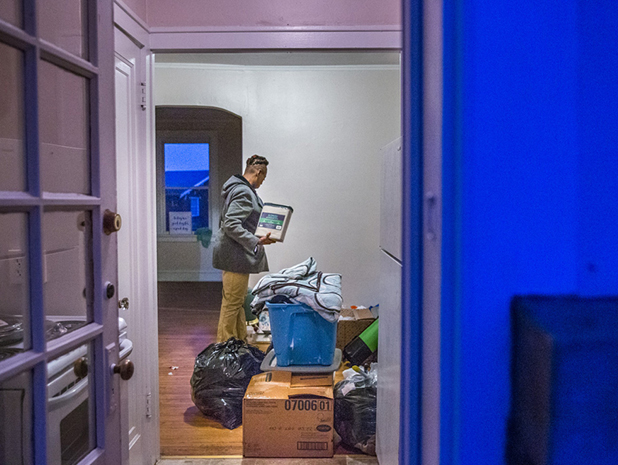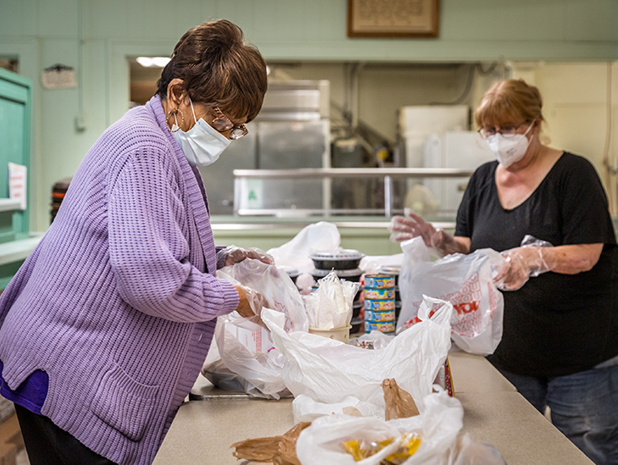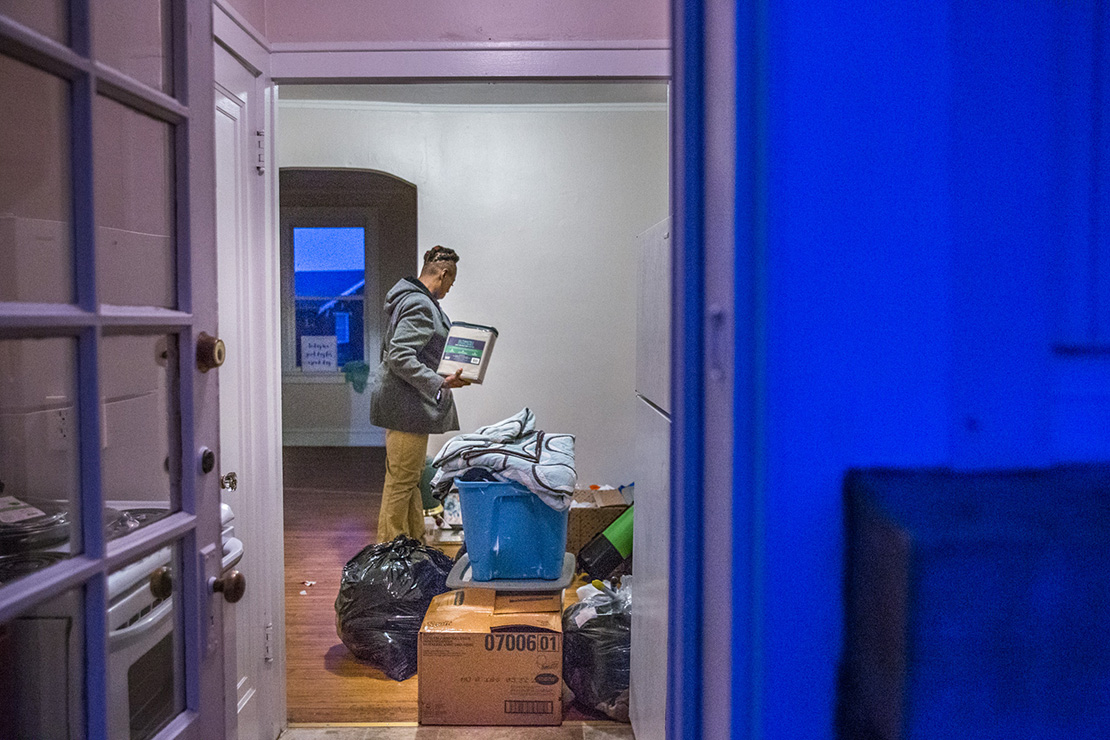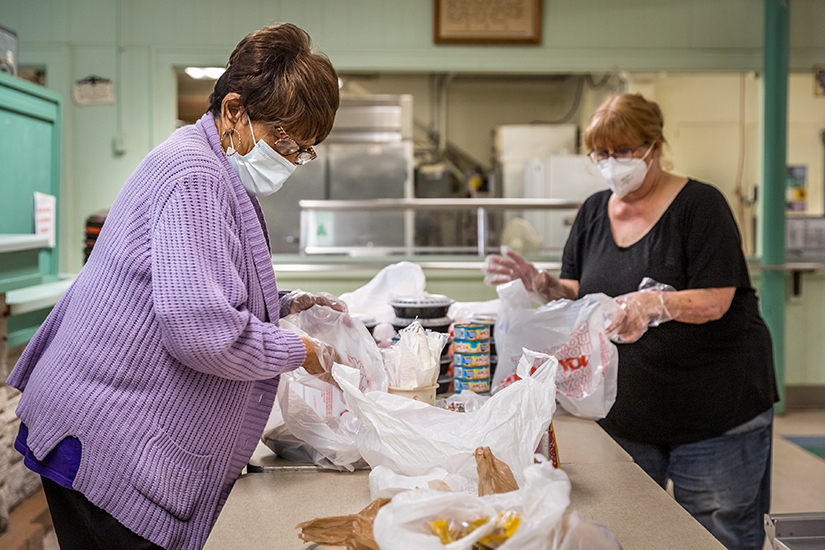STORIES

Institute for Peace and Justice (IPJ)
Photo credit: Lisa Johnston
CCHD helps Institute for Peace and Justice to empower formerly incarcerated women… Read More
Our Lady of the Holy Cross (OLHC) Senior Resource Center
Photo credit: Lisa Johnston
CCHD assists Our Lady of Holy Cross Senior Center in serving needs in the Baden neighborhood… Read More
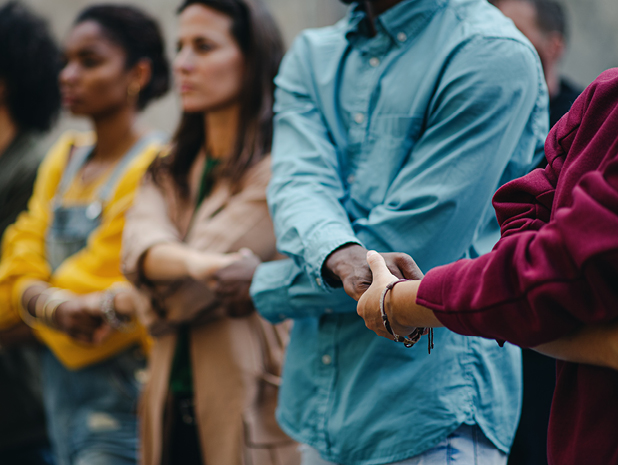
Missourians for Alternatives to the Death Penalty (MADP)
In 1988, Reginald Griffin was convicted of murder and sentenced to death; in 2013, he was… Read More
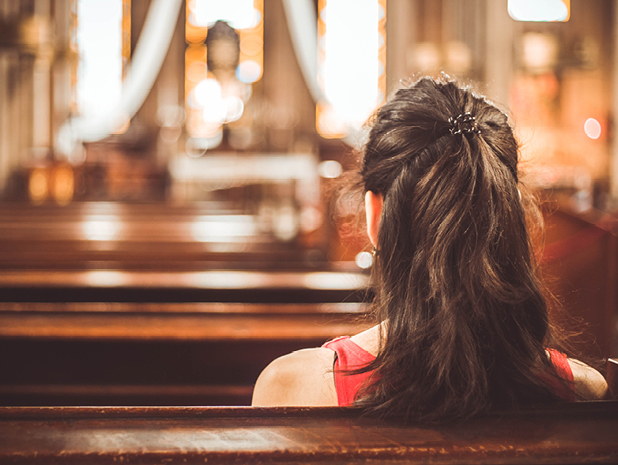
It’s the Catholic Thing: The Uniqueness of the Catholic Campaign for Human Development
All organizations have ways of proceeding. They set objectives… Read More
Institute for Peace and Justice (IPJ)
CCHD helps Institute for Peace and Justice to empower formerly incarcerated women
Photo credit: Lisa Johnston
Fall 2020
Tonya Rogers doesn’t think of herself as a leader — just someone a little further along in her journey.
That journey has been remarkable by any standard. Rogers’ past includes years of abuse, drug addiction, legal problems, and jail. Yet now that she is in recovery, she’s experienced healing in her relationships and she just graduated from the University of Missouri – St. Louis with a bachelor of social work and a minor in criminal justice.
She’s also passionate about working to show women with similar backgrounds they, too, can overcome their struggles.
“I just want it so bad for them,” she said. “There’s so much more out there in life, and I want them to get it.”
Rogers credits her turnaround to a program called Solving Our Situations (SOS). It’s run by The Institute for Peace and Justice (IPJ), an interfaith not-for-profit dedicated to non-violence and social justice, and this year it’s supported by a grant from the Catholic Campaign for Human Development (CCHD).
IPJ Executive Director Kathy McGinnis said each 10-week SOS class is geared toward helping women ex-offenders understand their behavior and find positive, assertive ways to solve their problems.
McGinnis also recruits and trains former students to help lead. Enter Rogers, who has facilitated classes for 13 years, and Tracy Stanton, also in recovery and studying social work, who has facilitated for two years. A portion of CCHD funds pay for their training and stipends.
Stanton said her past helps participants feel more open and hopeful.
“Women I used to engage in drugs with are now in class, and I’m facilitating,” she said. “Can you imagine? They come in apprehensive, hopeless, unsure, doubtful. And then they see me.”
According to McGinnis, women reentering the community from incarceration face a number of hurdles. Will they be able to find an apartment? A job? Will their families be willing to reconnect? Will addictions resurface or abusive relationships pick up where they left off?
It’s difficult to dismantle old behaviors, Stanton said, but by building relationships of trust, women in SOS can learn to stand up for themselves in these hard situations by articulating their feelings and needs without being passive or aggressive.
“[SOS] gave me the principles to be able to address without assuming or blaming and to take accountability of my own emotions. Your action does not determine my reaction,” she said.
McGinnis said this year IPJ will focus on helping women become advocates for change in the criminal justice system. Next up? Partnering with the Center for Women in Transition — also a support and advocacy program for those recently incarcerated — to establish an advocacy committee, provide training workshops, engage churches and communities on criminal justice issues, and more. Their efforts will include working to improve conditions in the city jail and changing attitudes of landlords unwilling to house people with criminal records. They’ll also speak to state legislators about issues that affect re-entry.
The drive to do advocacy grows as you see what these women deal with daily, McGinnis said.
Rogers sees them becoming empowered, too.
“Women come into this class not understanding their own power — quiet, not saying anything, not wanting to share — and they leave as strong, vocal women,” she said. “This class has not only changed my life, but a lot of others’ lives, too.”
IN BRIEF
The Issue: Women reentering the St. Louis community from jail/prison face challenges regarding employment, housing, relationships, and support.
The Impact: IPJ administers Solving Our Solutions (SOS), a 10-week class that empowers women ex-offenders to learn thoughtful, effective problem-solving skills and be advocates for criminal justice issues that affect re-entry.
The Details: CCHD-STL awarded IPJ a $3,000 grant to help train women ex-offenders to facilitate SOS and become effective advocates for policy change.
CCHD Priorities
Institutional Change: SOS empowers women to advocate for legislative changes affecting re-entry, such as mandatory minimum sentences, the cost of bail, expungement, and access to food stamps.
Priority for the Poor: All participants are low-income women who are developing skills to maintain employment, relationships, and sobriety.
Solidarity: IPJ will increase SOS advocacy efforts by teaming with the Center for Women in Transition, another support and advocacy program for recently incarcerated women.
Subsidiarity: Low-income ex-offenders help facilitate groups, and more are waiting to be trained. All women in the SOS program participate in revising and strengthening it.
Our Lady of the Holy Cross (OLHC) Senior Resource Center
CCHD assists Our Lady of Holy Cross Senior Center in serving needs in the Baden neighborhood
Photo credit: Lisa Johnston
Fall 2020
Vicky Forrest is no stranger to community in the Baden neighborhood.
Swing by Our Lady of the Holy Cross (OLHC) Senior Resource Center on Tuesdays or Thursdays and you’ll likely run into her enjoying a meal or playing cards. She might have her brother and sister with her, or she’ll be busy behind the sewing machine she brings to help mend items for people in need.
Forrest, a 10-year resident of Baden, is one of around 30 seniors who’ve regularly come to the center since it opened its doors in October 2018. There they’ve received a hot meal, a chance to socialize, and a place to voice needs and concerns about the neighborhood.
“It’s a warm place and it’s a welcome place,” Forrest said.
The resource center’s purpose goes beyond feeding its visitors; there, Baden residents are encouraged to become involved in improving their community and accessing resources for help with hardships. The center is supported this year by a grant from the Catholic Campaign for Human Development (CCHD).
OLHC Center Director Jan Quinn, who herself has lived in Baden for 31 years, said the neighborhood faces its share of problems. Many in the community struggle to meet basic needs, and they’ve long been plagued by high crime and predatory lending—issues that significantly worsened after the 2008 housing crisis, she said.
St. Louis City statistics show the 2019 average home price in Baden was $16,907, and census data lists the median household income at $29,500.
Quinn said she’s been involved through the years in other organizations helping the community, but all have since fallen by the wayside. As a result, many people living in Baden have no idea how to walk through difficulties they face, such as understanding renters’ rights or gaining access to healthcare without insurance, she said.
“There’s been nothing here for so long that people are craving it,” Quinn said.
CCHD funding supports OLHC Resource Center’s response: Offering meals alongside a series of educational sessions addressing topics of the seniors’ choosing. First up was a police officer who spoke about neighborhood crime and how emergency calls are prioritized. Others have taught about city services and healthcare.
The center also hopes to identify seniors’ individual needs through surveys and one-on-one interviews and to then teach seniors how to address those needs by hosting training sessions, letter writing campaigns, and public forums.
Quinn said she sees a difference already: There’s less graffiti. Homes are better maintained. People are using city services now more than ever before.
She hopes these are signs of long-term change.
“Somebody has to break the cycle,” she said. “It’s a big mountain to climb, but I’m willing to start somewhere and figure that out.”
IN BRIEF
The Issue: Women reentering the St. Louis community from jail/prison face challenges regarding employment, housing, relationships, and support.
The Impact: OLHC Senior Resource Center provides a space to share a meal, voice concerns, and learn how to improve their lives and neighborhood.
The Details: CCHD-STL awarded OLHC a $4,000 grant to help seniors identify problems and advocate for change in their community.
CCHD Priorities
Institutional Change: Monthly speakers will provide seniors with tools to improve their lives and neighborhood. The center will host training sessions, public forums, and letter writing campaigns.
Priority for the Poor: Baden’s low-income residents have a place to voice needs and concerns.
Solidarity: OLHC receives food donations from area churches, businesses and private donors. Volunteers prepare and serve meals.
Subsidiarity: Low-income individuals make up 60 percent of OLHC’s governing board. The resource center is located in and serves residents of a low-income area
Missourians for Alternatives to the Death Penalty (MADP)
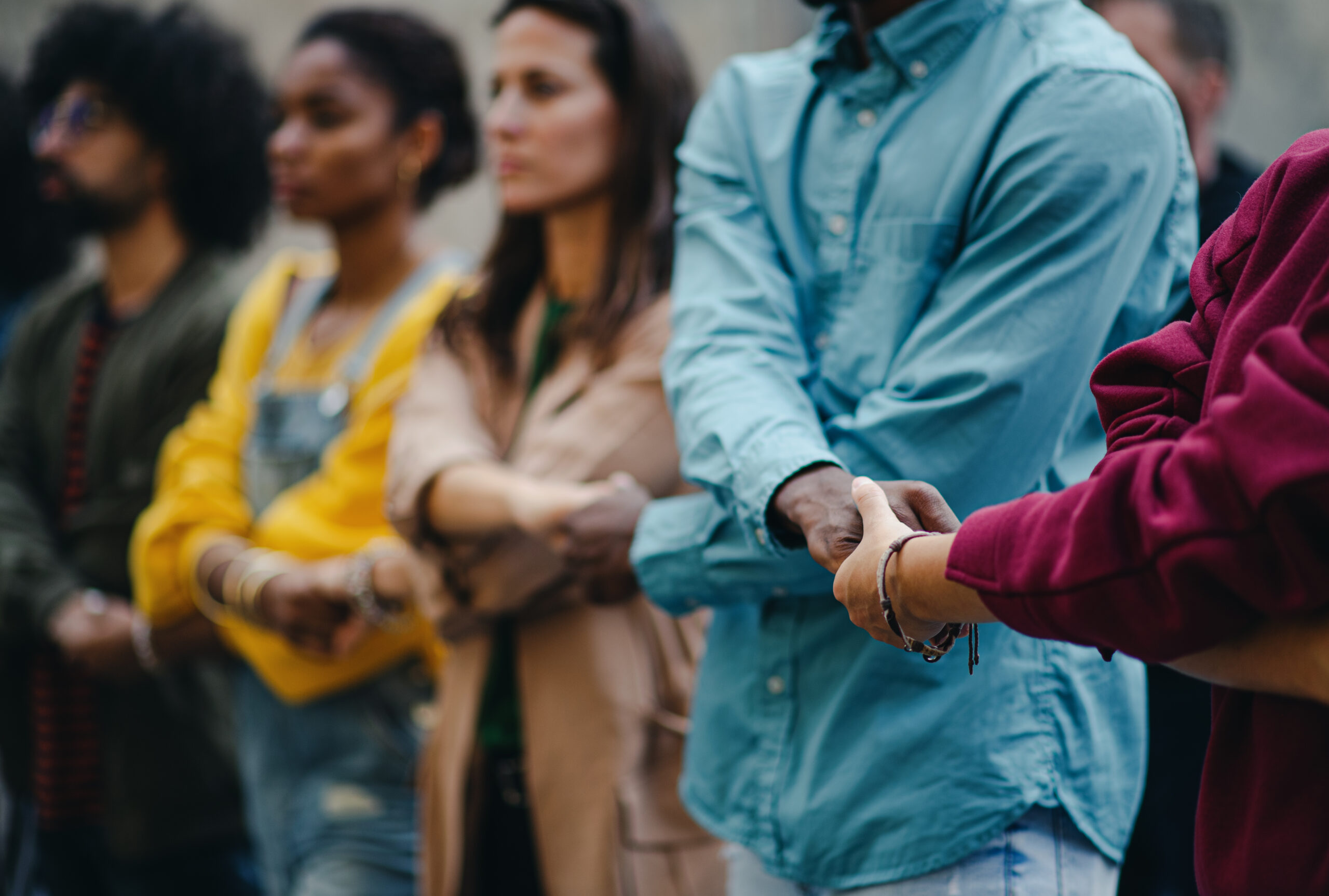
Fall 2020
In 1988, Reginald Griffin was convicted of murder and sentenced to death; in 2013, he was exonerated.
Griffin, a St. Louis native who now advocates for ending capital punishment, shared the facts of his story in November 2020 at a virtual rally held by Missourians for Alternatives to the Death Penalty (MADP): He had been found guilty of the stabbing death of another inmate at a correctional facility in Moberly, Missouri, but years later was granted a new trial after it was revealed prosecutors withheld critical evidence and an inmate who testified against him later confessed to the crime.
Griffin said people don’t think things like this can happen…until they do.
“I’m a living example of why the death penalty should be abolished,” he said. “You make a mistake with a human life, you can’t undo that.”
The rally was one of many MADP efforts to educate citizens and legislators about the costs and consequences of capital punishment. The work is supported this year by a national grant from Catholic Campaign for Human Development (CCHD).
Before the rally, MADP Director Elyse Max said CCHD funding will help the organization address the inequities experienced by people on death row who have mental illness as well as low-income people who cannot afford quality legal counsel. Another priority is preventing racial bias in the criminal justice system, she said. MADP’s website sites a September 2020 report by the Death Penalty Information Center detailing the history of racial discrimination in U.S. executions.
Max said MADP also advocates changing area prosecutors’ unjust practices, such as relying on testimony from jailhouse informants who may not be trustworthy.
It also regularly hosts public forums featuring people impacted by the death penalty, such as Griffin and Joe Amrine, another Missouri death row exonoree, both of whom serve on MADP’s governing board.
Fighting for the dignity of life
The Catholic Church opposes capital punishment. The Catechism of the Catholic Church calls the death penalty an “attack on the inviolability and dignity of the person,” and in November 2020 U.S. bishops released a statement calling on then-President Trump’s administration to stop federal executions. At that point the federal government had already put to death eight people that year.
Several speakers at MADP’s rally emphasized their belief that capital punishment is an unnecessary violence which only leads to more hurt and suffering.
Bob Linsey, a volunteer with Amnesty International, said no human being is a throwaway and redemption is possible in anyone.
“You take a life and you deny God the right to heal — not only those people but to heal others that come into contact with them,” he said.
MADP called attention to the cases of death row inmates Orlando Hall and Lisa Montgomery, and later that evening held a vigil for Hall. He was executed in Indiana the next day and Montgomery was put to death there the following January.
Griffin pledged to be the face and voice for people remaining on death row.
“I don’t know what else I can do to help this cause,” he said, “but I want you to know I’m ready and willing to lead the charge.”
IN BRIEF
The Issue: The Catholic Church opposes the death penalty. Some on death row have mental illness, are subject to racial bias and/or unjust trials, and often are low-income and cannot afford quality legal counsel.
The Impact: MADP educates citizens and legislators on the costs and consequences of capital punishment.
The Details: CCHD’s national office awarded MADP a $60,000 grant to work to repeal the death penalty through education and criminal justice reform.
CCHD Priorities
Institutional Change: MADP spotlights historic capital convictions which resulted from unjust processes and works with area prosecutors to develop new policies.
Priority for the Poor: MADP’s work benefits indigent people on death row who lack resources to pay for effective legal counsel.
Solidarity: MADP works closely with faith-based groups and community organizations, including the Missouri Conference of NAACP, the Organization for Black Struggle – St. Louis, Sisters of St. Joseph of Carondelet, and the Missouri Catholic Conference.
Subsidiarity: Two Missouri death row exonerees and one man who has been sentenced to death in Missouri sit on MADP’s governing board. All regularly share their experiences and advocate for change.
It’s the Catholic Thing: The Uniqueness of the Catholic Campaign for Human Development
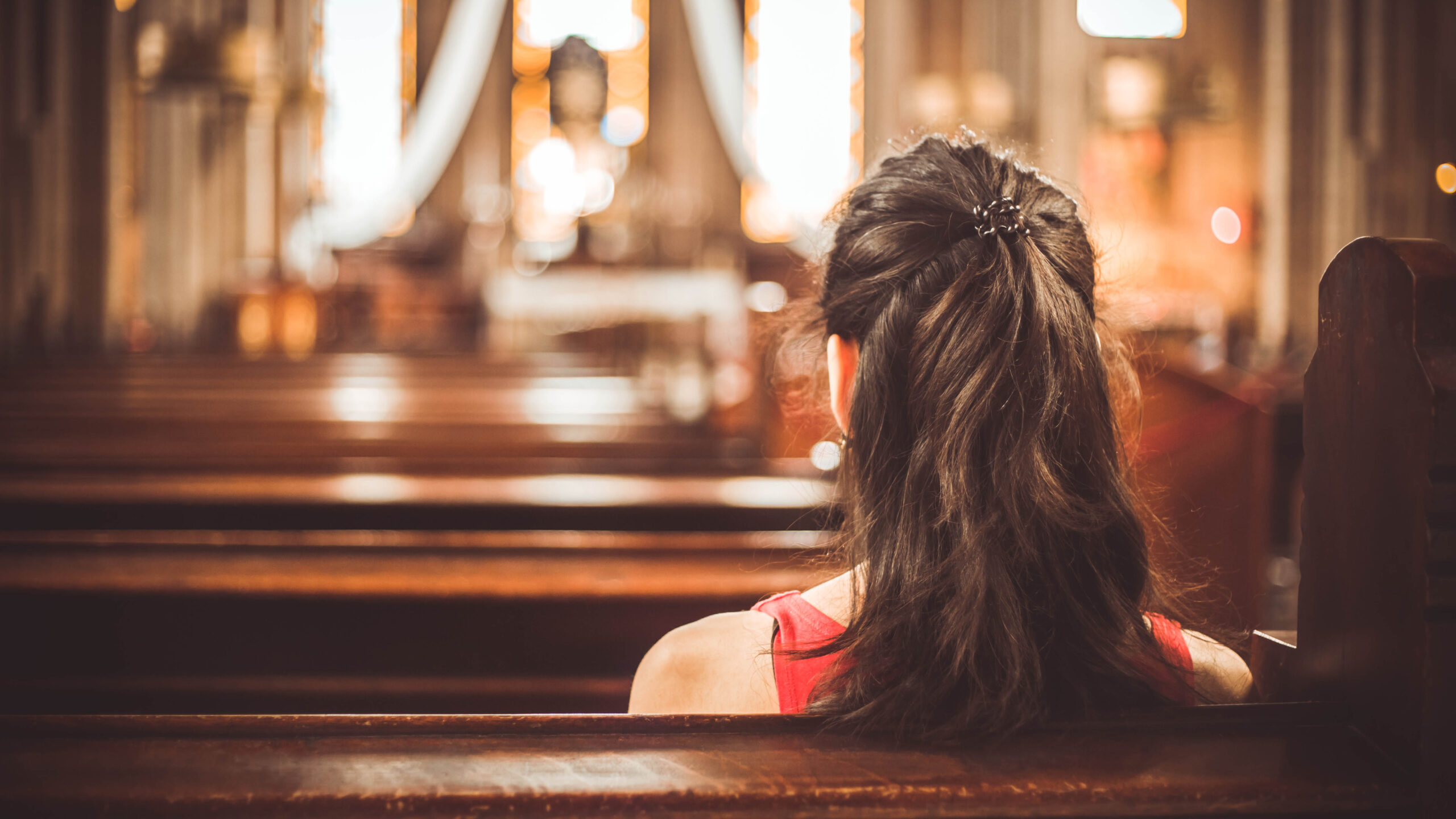
By Thomas M. Nolan
Director, Archdiocesan Human Rights Office, 1978-1998
All organizations have ways of proceeding. They set objectives (like making money) and they move ahead with their work (like making widgets). But some also have a style, a special way of accomplishing their objectives that sets them apart. Think of the unique way Ben & Jerry’s Ice Cream paid its top executives, with none making more than seven times what the lowest worker made. Or how the CEO of Avis Car Rental mandated that all his meetings be conducted standing up at a round table. In these and other cases, the style, the special way of proceeding, is a unique characteristic that reflects a particular set of values.
A uniqueness of style, a special way of proceeding, has marked the Catholic Campaign for Human Development. Since its inception 50 years ago, the program has required that at least half of the governing board of any organization it supports be composed of representatives from the population served. That’s very different from other anti-poverty organizations. For example, there are few low-income members on the governing bodies that oversee our federal welfare program (Temporary Assistance for Needy Families) or our food stamp program (Supplemental Nutritional Assistance Program), both of which are major anti-poverty initiatives. Or, in the private sector, few poor people are on the governing boards of the United Way or Catholic Charities programs across the country.
CCHD is different. It doesn’t disparage public or private efforts to eliminate poverty that follow a more traditional model; in fact, it readily supports all who seek income equality. But with a focus on the uniquely Catholic virtues of fraternity and solidarity, CCHD promotes an approach that combats poverty by doing with, not doing for. Simply put, CCHD says that those who are in poverty, in collaboration with the non-poor who work with them, should be able to make decisions about the programs that affect them. They deserve a place at the table. And, they deserve a place at the table because it’s the right thing. As the journalist Bill Moyers once said. “Charity provides crumbs from the table; justice offers a place at the table.”
And, it’s not just the right thing, it’s the Catholic thing. For decades, the Catholic Bishops of the U.S. have called for a commitment to the human dignity of every human being, and for the need to break down all that divides us, so that we can work together for the common good, especially the good of those who have been left out or left behind. As this nation faces division and alienation, inequality and discrimination, the unique approach of CCHD, emphasizing action with, rather than action for, is both appropriate and necessary. In the same vein as the U.S. Bishops, Pope Francis said recently:
“This is the time to restore an ethic of fraternity and solidarity, regenerating the bonds of trust and belonging. For what saves us is not an idea or an encounter. Only the face of another is capable of awakening the best of ourselves. In serving the people, we save ourselves.”
As it celebrates its 50th anniversary, the Catholic Campaign for Human Development can point to a solid record of success, and a unique way of realizing that success. No, it hasn’t ended poverty nor fashioned a fully just society. But it has made genuine progress in those areas and it has done so in a unique, effective, and singularly Catholic way. Not a bad accomplishment.

